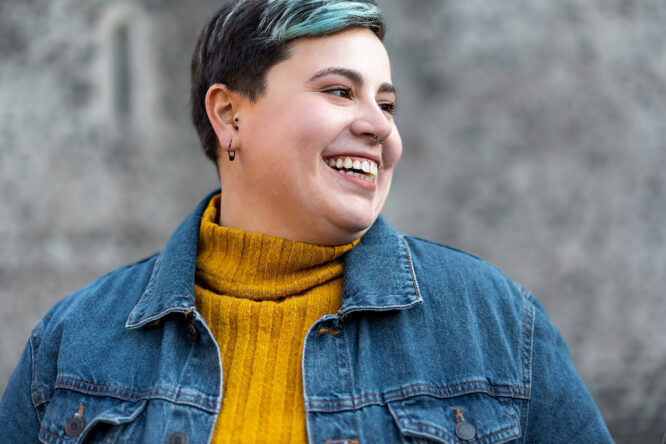Being well-rounded doesn’t mean you’ve got it all figured out, by any stretch of the imagination.

In reality, it means you’ve lived enough life to understand more than one side of things. It shows in how you listen, how you adapt, and how you carry both your softness and your strength at the same time. If you’ve made it through some of these things, chances are you’ve gained more depth than you give yourself credit for. These are just some of the experiences that shape people into genuinely well-rounded humans.
1. You’ve had to start over from scratch at least once.

Whether it was a move, a breakup, a career change, or just life pulling the rug out, starting over is no small thing. It teaches humility, resourcefulness, and the kind of resilience you can’t learn from comfort. When you’ve rebuilt from the ground up, you carry that quiet knowledge: even if things fall apart again, you know how to get back up. That kind of inner steadiness isn’t loud, but it’s deeply earned.
2. You’ve learned how to apologise without defensiveness.

Plenty of people can say “sorry.” Fewer can say it without excuses, ego, or trying to spin the situation in their favour. If you’ve learned how to own your mistakes with clarity, that’s growth. It shows you’ve moved beyond needing to be right all the time. It means you value repair over pride, and that ability makes your relationships stronger and more honest.
3. You’ve had your beliefs challenged, and changed some of them.

Being open to changing your mind doesn’t make you flaky. It makes you aware. If you’ve ever sat with discomfort, admitted you were wrong, or shifted a perspective you used to stand by, that’s character development. People who grow in this way tend to be more empathetic, less reactive, and more thoughtful. They’ve seen that truth evolves, and they’re not afraid to evolve with it.
4. You’ve been the outsider somewhere.

Whether it was culturally, socially, or emotionally, knowing what it feels like to not quite fit gives you a different kind of awareness. It makes you more observant, more compassionate, and often, more grounded. You notice when other people are left out. You don’t make assumptions. And you carry a kind of quiet understanding that only comes from having lived on the edges for a while.
5. You’ve lost something—or someone—you really loved.

Loss has a way of softening and sharpening people at the same time. If you’ve navigated grief, you probably carry a deeper appreciation for the people and moments in your life now. You know that nothing’s guaranteed, and that perspective changes the way you show up. It creates a kind of emotional maturity that can’t be faked—it has to be lived through.
6. You’ve had to work with people you don’t like, and still did your best.

Managing your reactions, choosing professionalism over pettiness, and staying grounded when people test your limits is an underrated skill. If you’ve done this, you’ve likely built real emotional regulation. It shows that you can navigate tension without letting it unravel you. That skill translates everywhere, from relationships to leadership to everyday problem-solving.
7. You’ve stepped away from something that no longer fit, even when it was hard.

Walking away from a job, friendship, habit, or identity that once felt like home takes serious clarity. If you’ve ever made a decision like that, you’ve built trust in yourself that can’t be easily shaken. It shows you value growth over comfort. And even if the fallout was messy, you now know what it means to choose yourself without needing anyone else’s permission.
8. You’ve sat with discomfort instead of rushing to fix it

Most people want quick relief. But if you’ve ever chosen to stay present with a hard feeling—without numbing it, avoiding it, or fixing it right away—you’ve developed serious emotional endurance. That stillness builds strength. It teaches patience and self-trust. And it allows you to stay steady in moments that would’ve once made you spiral.
9. You’ve been wrong about someone, and owned it.

Misjudging someone happens. But recognising that, owning it, and adjusting your lens is a sign of self-awareness. It shows you’re not attached to being “the good one”—you’re attached to learning. Such intense honesty makes you more thoughtful in how you show up. You think before you speak. You pay attention, and that awareness shows up in the way you treat other people moving forward.
10. You’ve experienced both success and failure in something that mattered to you.

When you’ve won and lost in the same arena—be it love, work, creativity, or something else—you gain depth. You learn what matters more than outcomes: consistency, care, and character. People who’ve tasted both ends of the spectrum often show more balance. They don’t get arrogant when things go well or crushed when they don’t. They stay steady and keep showing up.
11. You’ve supported someone else through their hard season.

Being there for someone—really being there—isn’t always easy. It requires emotional patience, flexibility, and a willingness to not make it about you. If you’ve done this, you’ve built real empathy. It shows you can hold space without needing to fix everything. That level of presence is rare, and it makes people feel safe around you, even when words fall short.
12. You’ve tried something you weren’t good at, and kept going anyway.

Doing something messy, uncomfortable, or slow to learn takes guts. If you’ve stayed with something you weren’t instantly great at, you’ve built humility and courage that goes far beyond the task itself. Putting in the effort teaches you to value progress over perfection, and it shows in how you encourage other people—not with empty cheerleading, but with grounded, lived experience.
13. You’ve had to unlearn something that was deeply ingrained.

Whether it came from family, culture, or fear, unlearning is serious work. If you’ve questioned the way you were raised, stepped away from inherited beliefs, or disrupted generational habits, you’ve shown serious growth. That kind of reflection takes more than awareness—it takes intention. Plus, it lays the foundation for more thoughtful, open, and adaptable relationships moving forward.
14. You’ve learned how to be alone without feeling empty

Solitude isn’t just silence—it’s space. If you’ve learned how to be on your own without needing constant validation or distraction, you’ve developed emotional depth that anchors you in every area of life. People who are good at being alone tend to show up better in rrelationships,too. Not because they need less, but because they know themselves more.




